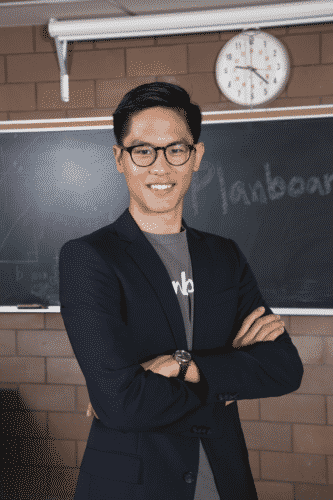A Conversation with William Zhou, CEO of Chalk As part of our follow-up with presenters from the 2019 Curiosity Conference, co-hosted by RoboTerra and the World Innovation Summit for Education (WISE), we caught up with William Zhou, CEO of Chalk, to get his take on AI in education. As he sees it, a key factor emerges as advancements in AI and machine learning take place in the education space. It all boils down to, “How do we keep that human element in the education system as well as in the entire experience?”
Even though AI may prove highly useful, there are elements of timing, adoption, and practicality to consider. It’s essential that technologists act as responsible innovators inside school culture. As William explains, testing may act as a leading indicator or benchmark for student achievement, but it’s equally important to ask the questions, “Are we actually delivering the right materials to the students? Are we adhering to the materials and standards we ought to be covering?”
While working with a variety of school districts, William has seen a common trend of adhering to old familiar ways even as new technologies are introduced. “A lot of [teachers] are still teaching from a textbook; a lot of them are still going cover to cover. They’re not necessarily covering what they ought to be covering at the right time. It’s a little bit embarrassing for some to say publicly, but these are the actual challenges from the ground level.”
William recognizes that culture is such a critical component to the success of technology in the classroom. Implementation is paramount in change management. To bring success, important questions need to be answered: “How are we going to get people bought in? How are we going to get folks trained up and using this technology?”
Whether a company is large or small, he points to making sure technology development considers the school framework involved. There’s a need to improve end outcomes incrementally, and that becomes an additional challenge. He warns against companies getting too far ahead of themselves and missing the mark. “We’ve got phenomenal entrepreneurs working in education. And there are phenomenal products that are two decades ahead. Pedagogically, it’s the right way of doing it; it’s the best practice for teachers. And yet, when they deploy it in the field, nobody uses it. It’s just too advanced. If you’re doing something that’s too forward-thinking, it will also fall flat.”
The success of AI in education will depend on predictive modeling that considers the human aspect of the equation. The teacher, rather than being replaced by technology, can be aided by AI. As William explains, “The more we can lessen the workflow for the teacher, the more we can start to do recommendations, grouping, modeling, and predicting where the students are and the better it is for the teachers to spend time doing what actually matters―teaching students.” By freeing up time, teachers can better concentrate on the human skills of creativity and social-emotional growth.
William asks us to look at AI in a predominantly supportive context, “Think of it as a personal assistant, so that the teacher, as a professional, can truly dedicate the maximum amount of time catering to every single child’s need. That will be the pinnacle.”
About William Zhou
 William Zhou is the CEO of Chalk, an education technology company that utilizes data to help K-12 schools. Zhou has been passionate about entrepreneurship from a young age, founding his first company in high school. He launched his first Internet business in 2010, which he sold at the age of 18 during his first year of computer science at the University of Waterloo. To pursue the bigger challenge of changing education, Zhou founded Chalk to create data-driven education. Forbes named Zhou top 30 under 30. From small, independent schools to large, national school networks, Chalk is behind the academic strategies influencing millions of students.
William Zhou is the CEO of Chalk, an education technology company that utilizes data to help K-12 schools. Zhou has been passionate about entrepreneurship from a young age, founding his first company in high school. He launched his first Internet business in 2010, which he sold at the age of 18 during his first year of computer science at the University of Waterloo. To pursue the bigger challenge of changing education, Zhou founded Chalk to create data-driven education. Forbes named Zhou top 30 under 30. From small, independent schools to large, national school networks, Chalk is behind the academic strategies influencing millions of students.
Follow William Zhou on Twitter
AuthorDr. Berger is one of many industry education correspondents for the Mind Rocket Media Group, An educator and former school administrator. He often hosts education panel discussions and develops strategic content. As an academic Dr. Berger is a guest lecturer at Vanderbilt University’s Owen Graduate School of Management. A former assistant principal, he has been an adjunct undergraduate professor and developer of online college courses. He is a passionate Detroit sports fan who has also adopted Nashville sports teams as his own.
Contact the Mind Rocket Media Group if you are interested in an industry interview and a placement on EdCircuit.
Further Reading
- edCircuit – How to Maximize the Benefits―and Mitigate the Risks―of AI in Education
- Entrepreneur –This Startup Didn’t Think Twice When It Came to Taking a Bold Chance
- The Globe and Mail –Think about sales strategy early – and often – when building a startup

